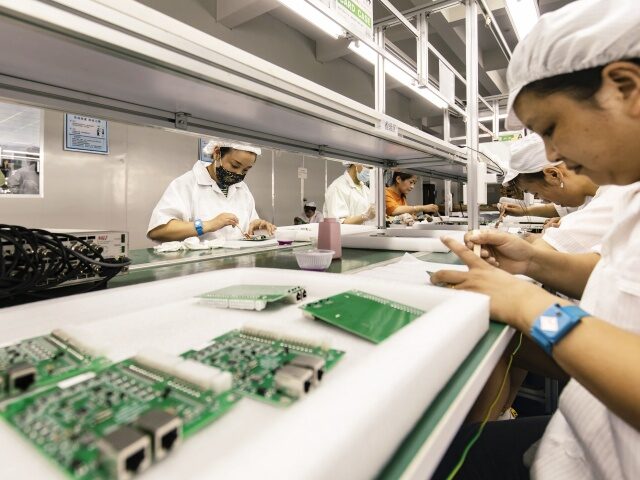The Wall Street Journal (WSJ) on Thursday reported on an alleged secret 2022 Chinese government directive called “Document 79,” whose purpose is to “delete America” from the Chinese tech industry.
Under this directive, Chinese state-owned enterprises (SOE) are required to phase out foreign software no later than 2027.
The WSJ explained:
American tech giants had long thrived in China as they hot-wired the country’s meteoric industrial rise with computers, operating systems and software. Chinese leaders want to sever that relationship, driven by a push for self-sufficiency and concerns over the country’s long-term security.
Document 79 has an anodyne name, but its alleged contents were explosive — so much so that Chinese officials and corporate executives were ordered to memorize it without taking pictures or making copies. Since 2022, the secret order has been wielded against American tech giants such as Dell, IBM, and Cisco.
Execution of Document 79 is reportedly overseen by the State-Owned Assets Supervision and Administration Commission (SASAC), which did not respond when asked for comment by the WSJ. More than half of China’s largest companies are SOEs, commanding almost $7 trillion in value.
Insiders said the shorthand nickname for the order among Chinese executives is “Delete A,” which is short for “Delete America.” Although Document 79 was top secret, the nickname has leaked into public discourse, as some Chinese software companies explicitly offer their services to help “Delete A” from corporate systems.
Doing so has required these enterprises to buy Chinese information technology products instead — a solution many executives are quietly unhappy with because the locally produced software and hardware are not as good as the forbidden American alternatives.
Some analysts said the forced shift to domestic IT products has done significant damage to the Chinese economy. The order has also knocked eight to ten percent off the market share of U.S. computer titans like Dell and Hewlett-Packard. Even Microsoft has lost market share in China despite furious efforts to keep its operating system alive there.
Major Chinese tech companies like Huawei are creating products to push American electronics out of the Chinese market, and some U.S. companies, like Oracle, have discovered that Chinese firms were established specifically to replace them. Analysts said regaining lost market share will be increasingly difficult for U.S. firms as they grow distant from Chinese consumers, unable to obtain their feedback and cater to their needs as domestic firms can.
The WSJ report makes for an interesting contrast with President Joe Biden boasting about blocking high-technology exports to China in his State of the Union (SOTU) address on Thursday night. Biden’s order was very narrowly focused on a few of the most advanced computer technologies, while Chinese dictator Xi Jinping’s secret order was much broader, inexorably pushing American tech completely out of China’s vast state-owned enterprises.
The WSJ said Biden’s export ban was one of the reasons Document 79 was written, although Xi has been pushing for greater reliance on domestic technology ever since Edward Snowden’s leaks about American surveillance technology in 2013.
Thursday’s report did not explain how the Wall Street Journal was able to view Document 79, but there have been earlier rumbles of its existence. Japan’s Yomiuri Shimbun reported on the directive and even knew the document number in July 2023, although the sweeping extent of the order and its timetable for “deleting America” was not evident in the report.
Yomiuri Shimbun described Document 79 as an order for Chinese SOEs to make quarterly reports about their progress in shifting to domestic computer software and hardware, a detail the WSJ also mentioned.
The Japanese paper was understandably concerned with how the order would push Japanese computer and peripheral manufacturers out of China’s market and found it deeply hypocritical that China would promulgate such an order while simultaneously trying to join the Comprehensive and Progressive Trans-Pacific Partnership (CPTPP), the entire point of which is to foster increased trade between member nations.
Yomiuri Shimbun also thought it was outrageous for China to talk about transparency and freedom of trade while the SASAC issued secret orders behind closed doors and refused to even mention them on its website.

COMMENTS
Please let us know if you're having issues with commenting.